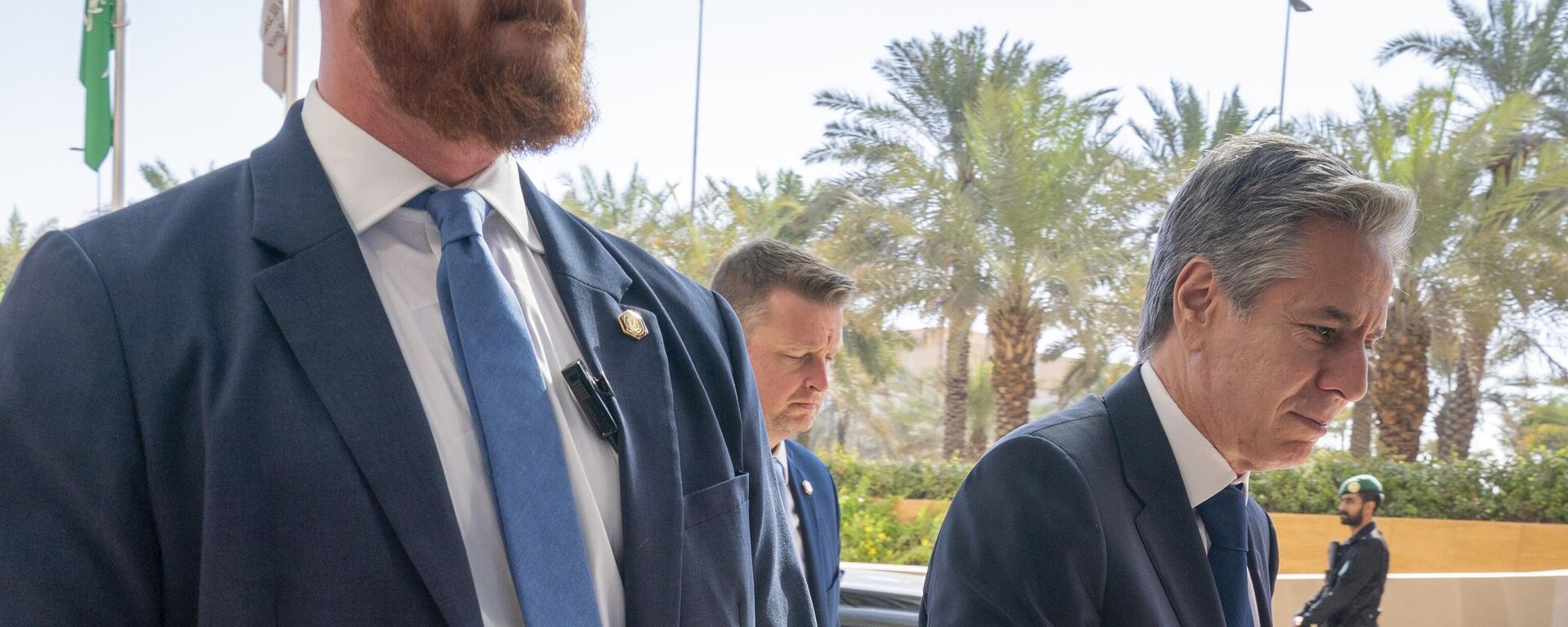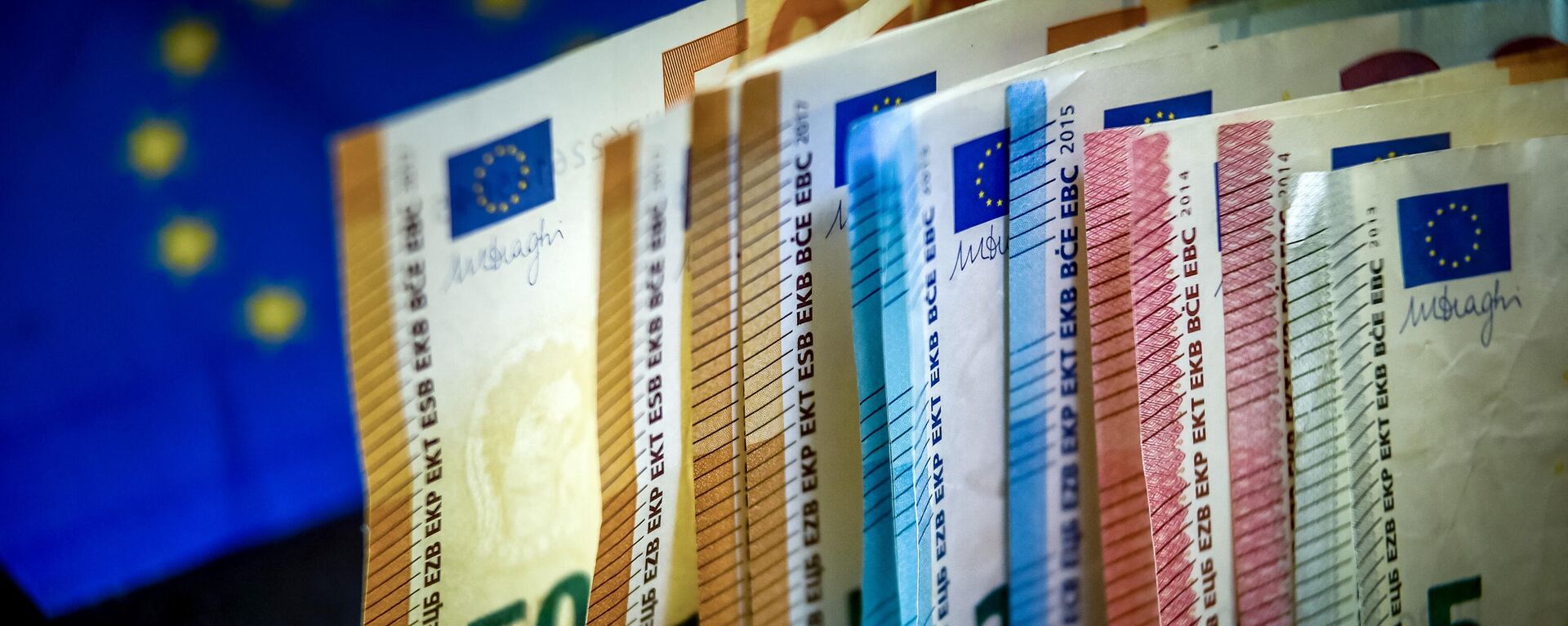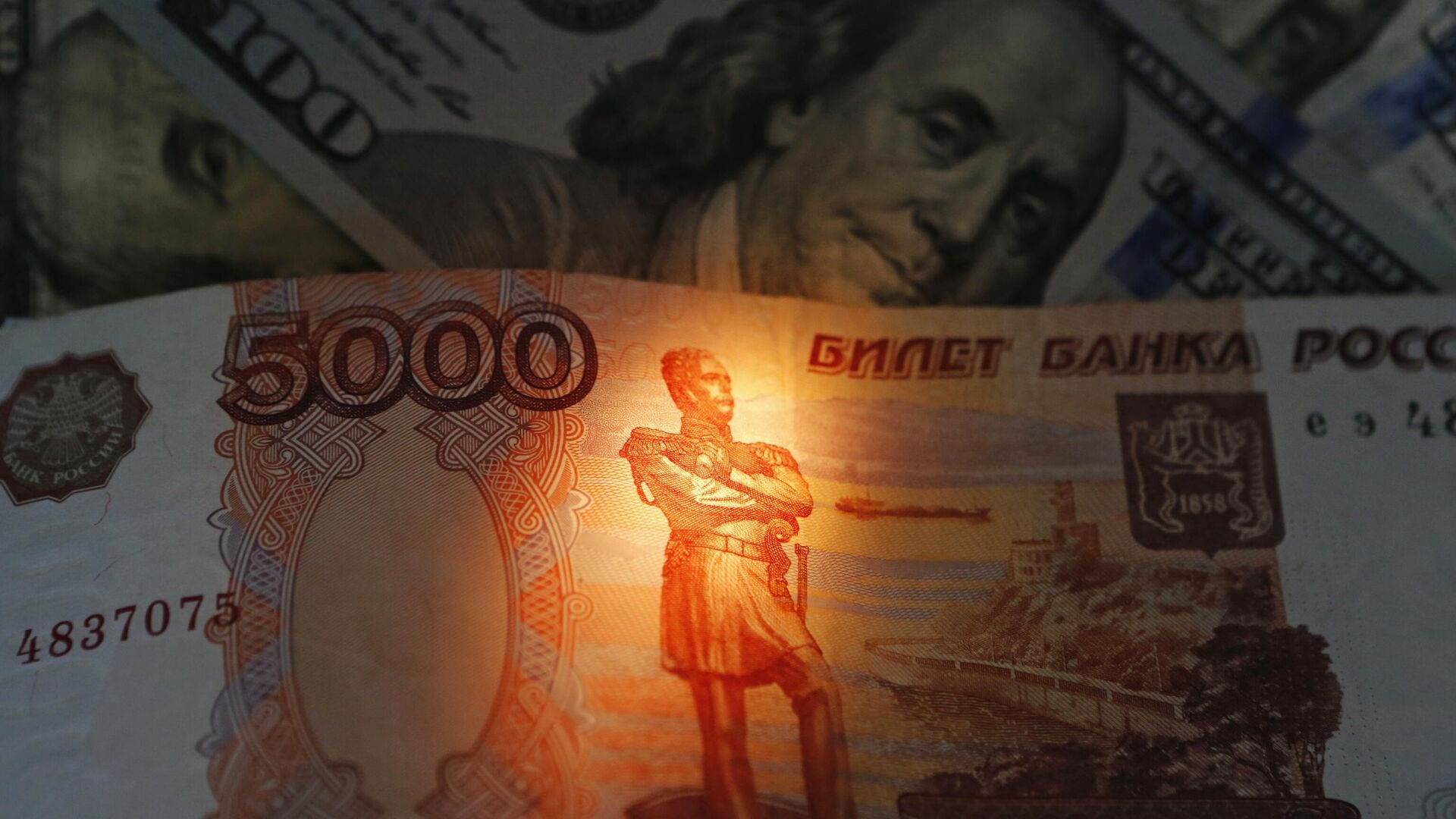https://sputnikglobe.com/20231105/why-west-is-terrified-of-transferring-seized-russian-assets-to-ukraine-1114741410.html
Why West is Terrified of Transferring Seized Russian Assets to Ukraine
Why West is Terrified of Transferring Seized Russian Assets to Ukraine
Sputnik International
Over $300 billion in Russian Central Bank assets ended up stuck in Western banks in February 2022 after the escalation of the Ukrainian crisis into a full-blown NATO-Russia proxy war. But there are a few compelling arguments explaining why the US and its allies can’t simply snatch the funds for themselves or give them to their proxies in Kiev.
2023-11-05T13:38+0000
2023-11-05T13:38+0000
2023-11-05T13:54+0000
economy
russia
ukraine
european union (eu)
russian central bank
nato
business
bank
transfer
seizure
https://cdn1.img.sputnikglobe.com/img/07e7/08/01/1112326823_0:159:3073:1888_1920x0_80_0_0_98566ce5c328a7d2ffbd2685c6d6c1b4.jpg
The political battle for Russian state assets trapped abroad continues to intensify. Last week, European Union leaders approved in principle a controversial measure allowing the bloc to skim profits from Russian assets for use in “Ukraine reconstruction,” and called on the European Commission to “accelerate work with a view to submitting proposals” in this direction.Across the Atlantic, US officials have similarly stepped up efforts to try to make use of the seized Russian assets, although these efforts have so far stuck to behind-the-scenes negotiations in the corridors of power occasionally reported on by the media.The discussions about legal justifications to seize the Russian funds outright or at least skim interest comes at a difficult time for the Ukrainian proxy war’s sponsors, with Western lawmakers with the power to dole out extra money for Kiev and the public at large turning their focus to the Palestinian-Israeli crisis. The reevaluation of priorities could not have come at a worse time for Ukrainian President Volodymyr Zelensky, whose government’s dependence on Western handouts has reached dangerous proportions.One Cannot Simply...Spend Seized Russian AssetsActually seizing Russia’s frozen assets and handing them over to Ukraine is easier said than done, with more than 20 months of threats and talking on the matter yet to bear fruit for advocates of the idea in Washington, Brussels, and Kiev.Part of the problem may relate to difficulties finding the money. While it was initially reported that some $300+ billion in Russian Central Bank funds got trapped abroad in February 2022, Washington-based financial experts revealed at the end of that year that the actual amount seized was closer to $80-100 billion, and that the US and the EU have had trouble finding the frozen funds. This past February, US business media reported that actually only about $36.5 billion had been found by the EU (which was estimated to contain over two thirds of seized funds to begin with), to date.Reputational HazardBut the real problem isn’t technical or legal, but relates to reputational risks. In an op-ed in a major British business newspaper on Sunday, commentator Martin Sandbu explained that “legal obstacles” are only the “ostensible justification” for the failure to deliver Russian money to Ukraine, since, theoretically, Western countries could join Canada in making changes to legislation and citing legal arguments claiming Russia has “no legal resource” to its money to justify the seizure and transfer.But the West hasn’t moved against Russia, given “the fear that confiscating Russia’s assets will make other non-Western countries pull their own reserves out of the West, in case one day the same treatment could be meted out to them,” the observer noted.And although the commentator spends the rest of the op-ed suggesting that this danger is overblown, and demanding that Russian reserves be seized and transferred “now” before the Ukrainian proxy war ends, the reality seems otherwise, with major powers which have spent decades fattening up Western banks and subsidizing the West’s development now thinking twice about parking assets in the US and Europe after seeing what was done to Russia.Regulators in China, for example, held an emergency conference with major domestic and foreign banks last year to brainstorm ways to protect PRC assets should the US impose sanctions similar to those it has slapped on Russia, with officials reportedly “put on alert” of the West’s ability to arbitrarily seize foreign assets. Beijing, for the record, is one of Washington’s biggest foreign creditors, owning about $860 billion in US Treasuries alone, and amassing assets abroad worth nearly $10 trillion.Worse yet, according to veteran international criminal and human rights lawyer Christopher Black, is that in addition to constituting an “act of war,” the seizure and transfer of Russian funds would fundamentally undermine the rule of law in Europe, “because if they can do this to Russia they can do it to any citizens’ assets.” Effectively, clients of European banks will be subject not to law, but to the whims of politicians, undermining the EU’s credibility among foreign depositors, Black told Sputnik earlier this year.Reputational risks are precisely the reason why European banking giant Switzerland has refused to even entertain the idea of transferring the $8 billion in Russian assets it frozen in its coffers.
https://sputnikglobe.com/20231101/threat-of-us-govt-shutdown-returns-amid-congress-row-over-israel-and-ukraine-aid-1114642568.html
https://sputnikglobe.com/20231016/saudi-crown-prince-makes-blinken-wait-overnight-for-audience-amid-gaza-crisis-1114233496.html
https://sputnikglobe.com/20231029/why-eus-plan-to-use-russias-frozen-assets-for-aiding-ukraine-is-wishful-thinking-1114577988.html
russia
ukraine
Sputnik International
feedback@sputniknews.com
+74956456601
MIA „Rossiya Segodnya“
2023
News
en_EN
Sputnik International
feedback@sputniknews.com
+74956456601
MIA „Rossiya Segodnya“
Sputnik International
feedback@sputniknews.com
+74956456601
MIA „Rossiya Segodnya“
russia, ukraine, assets, seizure, money, cash, frozen, freeze, transfer, banking, bank, law, legality
russia, ukraine, assets, seizure, money, cash, frozen, freeze, transfer, banking, bank, law, legality
Why West is Terrified of Transferring Seized Russian Assets to Ukraine
13:38 GMT 05.11.2023 (Updated: 13:54 GMT 05.11.2023) Over $300 billion in Russian Central Bank assets ended up stuck in Western banks in February 2022 after the escalation of the Ukraine crisis into a full-blown NATO-Russia proxy war. But there are a few compelling arguments explaining why the US and its allies can’t simply snatch the funds for themselves or give them to their proxies in Kiev.
The political battle for Russian state assets trapped abroad continues to intensify. Last week, European Union leaders
approved in principle a controversial measure allowing the bloc to skim profits from Russian assets for use in “Ukraine reconstruction,” and called on the European Commission to “accelerate work with a view to submitting proposals” in this direction.
Across the Atlantic, US officials have similarly stepped up efforts to try to make use of the seized Russian assets, although these efforts have so far stuck to behind-the-scenes negotiations in the corridors of power occasionally
reported on by the media.
The discussions about legal justifications to seize the Russian funds outright or at least skim interest comes at a difficult time for the Ukrainian proxy war’s sponsors, with Western lawmakers with the power to dole out extra money for Kiev and the public at large
turning their focus to the Palestinian-Israeli crisis. The reevaluation of priorities could not have come at a worse time for Ukrainian President Volodymyr Zelensky, whose government’s dependence on Western handouts has
reached dangerous proportions.

1 November 2023, 19:39 GMT
One Cannot Simply...Spend Seized Russian Assets
Actually seizing Russia’s frozen assets and handing them over to Ukraine is easier said than done, with more than 20 months of threats and talking on the matter yet to bear fruit for advocates of the idea in Washington, Brussels, and Kiev.
Part of the problem may relate to difficulties finding the money. While it was initially reported that some
$300+ billion in Russian Central Bank funds got trapped abroad in February 2022, Washington-based financial experts revealed at the end of that year that the actual amount seized was closer to
$80-100 billion, and that the US and the EU have had trouble finding the frozen funds. This past February, US business media
reported that actually only about $36.5 billion had been found by the EU (which was estimated to contain over two thirds of seized funds to begin with), to date.
But the real problem isn’t technical or legal, but relates to reputational risks. In an op-ed in a major British business newspaper on Sunday, commentator Martin Sandbu
explained that “legal obstacles” are only the “ostensible justification” for the failure to deliver Russian money to Ukraine, since, theoretically, Western countries could join Canada in making changes to legislation and citing legal arguments claiming Russia has “no legal resource” to its money to justify the seizure and transfer.
But the West hasn’t moved against Russia, given “the fear that confiscating Russia’s assets will make other non-Western countries pull their own reserves out of the West, in case one day the same treatment could be meted out to them,” the observer noted.
“The concern,” Sandbu writes, “is that this could destabilize the global financial system and in particular diminish the dollar’s and the euro’s captive investors among central bank reserve managers. The European Central Bank has issued a strong warning to European policymakers against even taxing EU companies making windfall profits on blocked Russian assets – which seems the most that the sanctions coalition is currently willing to contemplate.”
And although the commentator spends the rest of the op-ed suggesting that this danger is overblown, and demanding that Russian reserves be seized and transferred “now” before the Ukrainian proxy war ends, the reality seems otherwise, with major powers which have spent decades fattening up Western banks and subsidizing the West’s development now thinking twice about parking assets in the US and Europe after seeing what was done to Russia.
Regulators in China, for example,
held an emergency conference with major domestic and foreign banks last year to brainstorm ways to protect PRC assets should the US impose sanctions similar to those it has slapped on Russia, with officials reportedly “put on alert” of the West’s ability to arbitrarily seize foreign assets. Beijing, for the record, is one of Washington’s biggest foreign creditors, owning about $860 billion in US Treasuries alone, and amassing assets abroad worth
nearly $10 trillion.Saudi Arabia, another major creditor and investor in the US and Europe, whose allegiance is crucial in propping up the petrodollar, has also watched the West’s actions vis-à-vis Russia closely, and has made major moves this year to dramatically diversify geostrategic alignment, normalizing ties with Iran, joining the BRICS bloc, and rejecting US requests to ramp up oil production to offset the global economic downturn sparked by NATO’s proxy war with Russia.

16 October 2023, 17:39 GMT
“If the EU implements what could be called a ‘legal theft,’ the EU’s financial reputation would be ruined among non-Western countries,” School for Advanced Studies in the Social Sciences director of studies Jacques Sapir told Sputnik last month. “I don’t see investors from the Gulf States or from India or China to be very comfortable with this situation,” the observer stressed.
Worse yet, according to veteran international criminal and human rights lawyer Christopher Black, is that in addition to constituting an
“act of war,” the seizure and transfer of Russian funds would fundamentally undermine the rule of law in Europe, “because if they can do this to Russia they can do it to any citizens’ assets.” Effectively, clients of European banks will be subject not to law, but to the whims of politicians, undermining the EU’s credibility among foreign depositors, Black told Sputnik earlier this year.
Reputational risks are precisely the reason why European banking giant Switzerland has
refused to even entertain the idea of transferring the $8 billion in Russian assets it frozen in its coffers.

29 October 2023, 15:00 GMT





